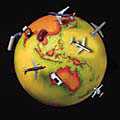Trading Up

The Doha Development Agenda
Anne McGuirk
The launch of a new trade round in Doha last November was a major breakthrough following the debacle in Seattle in 1999. The new round places the needs and interests of developing countries at the heart of its work, but a successful outcome for rich and poor nations alike is by no means a foregone conclusion.
Market Access for Developing Countries
Hans Peter Lankes
Poor countries could boost growth and reduce poverty by expanding exports to the rich countries and to each other. But, despite the progress made in trade liberalization under successive multilateral agreements, many barriers persist in both developing and industrial countries.
Lifting All Boats: Why Openness Helps Curb Poverty
Andrew Berg and Anne Krueger
Although there is a near-consensus among economists that trade liberalization strongly promotes growth and poverty reduction, concern about its ill effects has not abated. Hence, it is important to assess the quality of the evidence regarding the links between openness, growth, and poverty reduction. This article provides a critical survey of recent studies.
What Will WTO Membership Mean for China and Its Trading Partners?
Ramesh Adhikari and Yongzheng Yang
On December 11, 2001, after 15 years of arduous negotiations, China became the 143rd member of the World Trade Organization (WTO). The opening of an economy as large as China's can be disruptive to some developing countries in the short run, but, in the long run, it should benefit not only China but also its trading partners.
Is Globalization Good for the Poor in China?
Shang-Jin Wei
Developing countries worry that opening up to trade with the rest of the world may make the poor poorer and the rich richer, with China sometimes cited as an example of growing income inequality. A recent IMF study, however, finds that the reality is far more complex.
|
 |
Also in This Issue

The Tošovský Dilemma: Capital Surges in Transition Countries
Leslie Lipschitz, Timothy Lane, and Alex Mourmouras
Transition countries that open themselves up to global capital markets are like honest citizens in a dangerous world—they are vulnerable to large and potentially erratic flows. Such flows should not be seen as one-off destabilizing events: they are intrinsic to the transition process and therefore need to be factored into policy formulation.
The Commonwealth of Independent States' Troubled Energy Sectors
Paul Mathieu and Clinton R. Shiells
The energy sector plays a large economic role in several of the countries of the former Soviet Union, given their vast reserves of oil and natural gas. But the sector is riddled with distortions and inefficiencies—especially because of discriminatory access to transit pipelines—that hinder both intraregional and external trade and keep the region from realizing its economic potential.
The Future of Pension Reform in Latin America
David de Ferranti, Danny Leipziger, and P.S. Srinivas
The Latin American countries are at the vanguard of global pension reform. Eight have reformed their pension systems in the past 20 years, and additional reforms are now being considered throughout the region. Did the earlier reforms work? What should new reforms aim for? And are the ideas driving the reforms sound?
Combating Money Laundering and the Financing of Terrorism
Eduardo Aninat, Daniel Hardy, and R. Barry Johnston
Money laundering and terrorist financing can threaten financial stability and economic prosperity, adding to the gravity of the underlying crimes. The IMF, working closely with the global community, is stepping up its efforts to fight these abuses.
Challenges of the "E-Banking Revolution"
Saleh M. Nsouli and Andrea Schaechter
Electronic banking is the wave of the future. It provides enormous benefits to consumers in terms of the ease and cost of transactions. But it also poses new challenges for country authorities in regulating and supervising the financial system and in designing and implementing macroeconomic policy.
|
